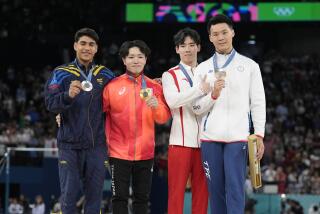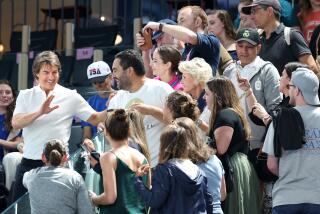London Olympics: British patriotism blossoms amid the Games
LONDON — Ironic detachment may be the guiding principle of acceptable behavior in Britain, but Hannah Prince is having none of it.
British flag in hand, the 21-year-old university student traveled to London from western England to attend the Olympics with her boyfriend, both of them ready to cheer their hearts out for “Team GB” with no trace of self-consciousness.
“We’re a lot more reserved than other nations, whereas Americans will wave their flags at anything. We should do more of it,” Prince said.
Anyone in search of phlegmatic, understated Brits had best not come to London at the moment. Self-deprecation has been cast aside in favor of some un-British national chest-thumping.
This multicultural capital — and much of the rest of the nation — is now a sea of Union Jacks, strung from balconies and in shop windows, slung around necks and shoulders, stamped on T-shirts and umbrellas. The air is so thick with British fervor that even the grumpiest and most cynical of people — also known as journalists — confess to getting swept up.
“During the opening Olympic ceremony I felt a strange stirring inside,” wrote an alarmed Simon Kuper, a columnist for the Financial Times. “At first I thought it was the dodgy chicken sandwich bought in the stadium, but I eventually identified the feeling: British patriotism. This was new to me.”
After a slow start for the British team, a few gold medals in such patrician events as cycling and rowing, have stoked the fire.
But even sports in which British competitors basically show up to be pummeled offer opportunities for outpourings of a particular strain of Britishness. How else to explain the enthusiastic support of Chris Musgrave for the British handball team, which doesn’t just get beaten by its opponents but buried?
“It’s the underdog really,” said Musgrave, 23. “We British love the underdog.”
In ordinary times, Britons are willing to leave hot-blooded patriotism to their cousins across the Atlantic. The sun set on the British Empire long ago, and people here have traded in teenage testosterone (which they now see coursing through American veins) for worldly wisdom.
Yet the last year and a half has been a bumper period for noisy British pride. The flags were out in spades for the royal wedding of Prince William and Kate Middleton in April 2011, and again for this year’s celebration of Queen Elizabeth II’s diamond jubilee marking 60 years on the throne. Such occasions are about the closest this country gets to a Fourth of July. Naysayers, such as the relatively small contingent that wants to do away with the monarchy, were drowned out in the excitement
Now come the Olympic Games, which aren’t just giving British athletes a shot at glory, but are being held on British soil, and fairly successfully at that, at least so far. Complaints of cost overruns, overzealous security and bad weather have given way to widespread good cheer, evidenced by the chattiness — also rather un-British — of thousands of Olympic volunteers.
“It’s good to see us doing something well for a change and not screwing it up as we normally do,” Musgrave said with a laugh.
The flag knotted around his neck was among the less-exuberant manifestations of Britain patriotism at the Olympic Park one recent afternoon. There were red, white and blue clown-style wigs; there were flag-painted faces. There was the slightly disturbing sight of two grown men dressed in what can only be described as extra-large Union Jack onesies.
The enthusiasm cuts across generations. Irene Marillat, who is in her mid-50s, got in on the act with a Union Jack decal stuck on her cheek.
Marillat had always found it remarkable to see so many American flags on display when she visited her daughter and Yankee son-in-law in New York.
“Whenever we go out there, we see flags out over doorsteps. We would never do that,” Marillat said.
But the Olympics make flag-waving here respectable — another key British attribute — without the taint of chauvinism or nationalism some critics associate with it.
Indeed, the Olympic Games are one of the few sporting events that feature a unified British team, unlike, for example, soccer tournaments in which England, Scotland and Wales field separate squads under separate banners — the red-on-whiteSt. George’s Cross for England, the white-cross-on-blue Saltire for Scotland and the red dragon for Wales.
Even Northern Irish athletes play for Team GB, though the name “Great Britain” technically does not cover Northern Ireland. (“United Kingdom” does.)
Here at the London Olympics, the only colors being flown are the Union Jack.
“This is helping us reclaim the flag for all the right reasons,” said Marillat. “It’s pulling us together.”
More to Read
Sign up for Essential California
The most important California stories and recommendations in your inbox every morning.
You may occasionally receive promotional content from the Los Angeles Times.











